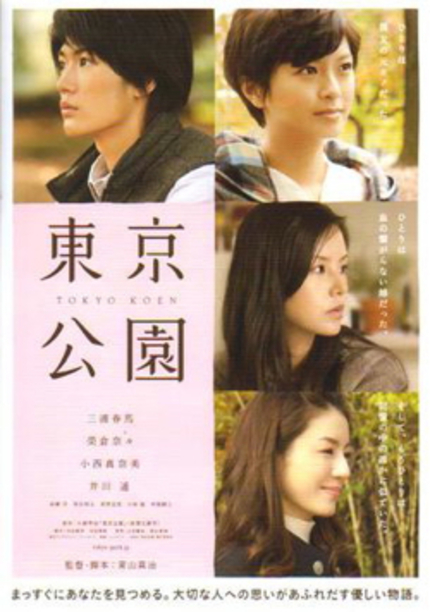HKAFF 2011: TOKYO KOEN Review

Even before the film begins, Koji has been through plenty of hardship. His mother died at a young age, leaving him and his father to rebuild their lives. His father remarried and moved to the countryside, but now his second wife is seriously ill and bedridden in a remote hospital. The marriage also gave Koji a step-sister, Masaki (Manami Konishi). Nine years his senior, she is nevertheless warm and affectionate to Koji, getting him a job at her friend's restaurant and stopping by at every opportunity to see how he is getting on.
As if Koji hadn't suffered enough, his roommate Hiro has recently died, in circumstances that are never fully explained, but which may well have been suicide. His death leaves Koji to look after Hiro's girlfriend, Miyu (Nana Eikura), a horror movie fan and binge drinker who continues to come to Koji's bar and their apartment. Strange as it may seem, Koji can still see Hiro, who mopes around the house looking for some kind of non-specific closure, and in doing so acutely echoes John Landis' AN AMERICAN WEREWOLF IN LONDON, although Hiro is spared the fate of decomposition during his time in limbo.
To escape, Koji pursues his hobby of photography, and when he is approached by a crazed paranoid dentist to tail his wife and photograph her - for 20,000 yen a day! - Koji takes the job, embraces his newfound role of private detective and roams the parks of Tokyo, photographing the beautiful, yet enigmatic Yurika (Haruka Igawa), with whom he soon becomes infatuated.
Besides Landis and frequent references to other horror films, there are obvious allusions to Antonioni's BLOW UP, at least in the film's opening third. Rather than uncover a murder plot, however, Koji is distracted from his duties by Miyu and Masaki, and their relationships begin to get increasingly complex. Aoyama is careful to keep things light, however, even as the plot flirts occasionally with darker themes. Shot almost entirely during the day, in beautiful parks and other peaceful surroundings, Koji's numerous options present him with hope for the future rather than doom and depression as the film gently approaches its upbeat and optimistic conclusion.
The performances here are somewhat reserved as one might expect from a Japanese romantic drama like this but altercations and misunderstandings never descend into histrionics and Miura ensures that Koji, passive though he may very well be most of the time, is still pro-active enough not to become frustrating. The result is a surprisingly pleasant and enjoyable experience from a director not known for his lightness of touch or positive outlook. On the strength of TOKYO KOEN let us hope that Aoyama continues to look on the brighter side of life and explore this particular vein of storytelling further in the future.

Do you feel this content is inappropriate or infringes upon your rights? Click here to report it, or see our DMCA policy.






